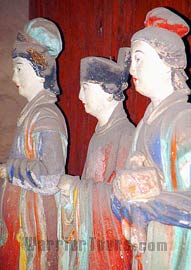Song Dynasty
 According to the change of the territory and capital, Song Dynasty was divided into Northern Song (960 – 1127) and Southern Song (1127 – 1279).
According to the change of the territory and capital, Song Dynasty was divided into Northern Song (960 – 1127) and Southern Song (1127 – 1279).
In 960, Zhao Kuangyin, the commander of the Imperial Guards serving the Later Zhou Dynasty (951 - 960), seized power through a coup in Chenqiao (Chenqiao Town of Henan Province). Then, he established the Song Dynasty and made Dongjing (currently Kaifeng City of Henan Province) the capital. Zhao Kuangyin took the advice of Zhaopu, prime minister, and had the power of the officials reduced to a certain extent. Thus the emperor's power exceeded that of all of the former dynasties, which had a positive effect on political stability. Meanwhile, the Northern Song also made some progress in economy, culture and foreign trade.
However, during the middle times of the Northern Song, the state politics increasingly sagged. The reforms of Fan Zhongyan and Wang Anshi lessened the social contradictions, but they couldn't help Northern Song to achieve long-term prosperity. In the later period of the Northern Song, the sovereign became extremely rotten. In 1127, The Army of the Jin Dynasty (1115 – 1234) invaded Kaifeng, and Emperors Huizong and Qingzong were kidnapped. Thereafter, the Northern Song Dynasty came to an end.
Zhao Gou, King Kang of Northern Song, escaped to Yingtianfu (Shangqiu County of Henan Province), reestablished the Song Dynasty which became the the Southern Song Dynasty, and named himself Emperor Gaozong in 1127. Later, under the threat of the Jin army, he moved to Lin'an (Hangzhou) which was established as the capital in 1138.
During the Southern Song, the territory was limited to the south of the Yangtze River. The rulers pursued a peace policy. They answered to the King of the Jin Dynasty. They suppressed any rebels who fought against the Jin Dynasty, and even killed many patriotic generals. They also paid a large amount of tribute to the Jin Dynasty in order to maintain the peace. In 1267, the army of the Yuan Dynasty (1271 - 1368) captured Lin'an, but the Northern Song Dynasty did not end. The remaining followers of King Yi Zhao Shi and King Guang Zhao Bing continued to resist the Yuan Dynasty, and Northern Song wasn't crushed until the last emperor Zhao Bing died in 1279.
![]() Economy and Culture
Economy and Culture
Song Dynasty was a dynasty that produced more scientific and technological achievements than any other dynasties in Chinese history, and the culture then was also the most prosperous in ancient Chinese history. The earliest paper currency appeared in the Song Dynasty because of the development of the commodity economy. Three of the Four Great Inventions of China were invented and applied at that time; these being printing, compass and gunpowder. Meanwhile, a large number of poets and authors existed then such as Su Shi, Ouyang Xiu, Fan Zhongyan, Wang Anshi, Xin Qiji, Li Qingzhao and Zhu Xi. Calligraphers of the Song Dynasty are too numerous to mention, the most famous being Su Dongpo, Huang Tingjian, Mi Fu and Cai Xiang. With Zhang Zeduan as the representative, many notable painters also lived in the Song Dynasty.

